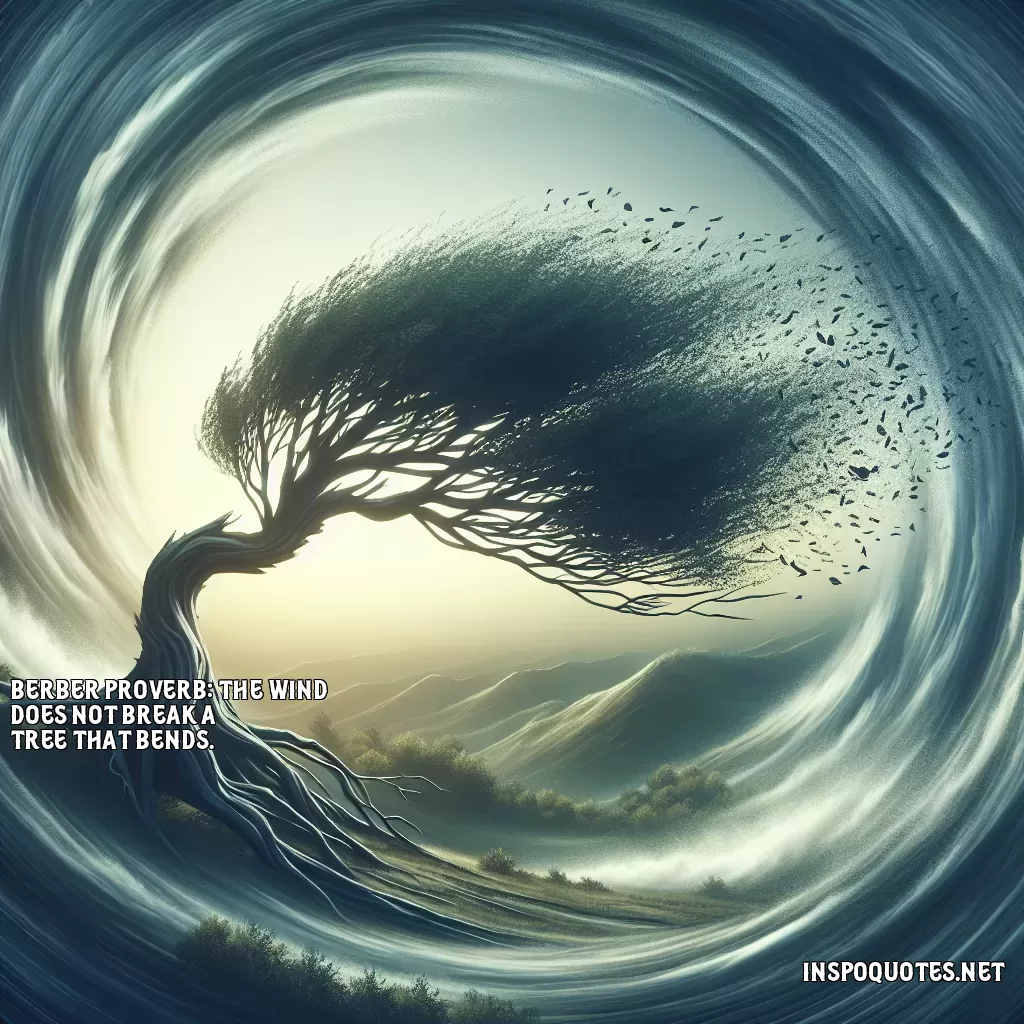
Berber Proverb: The wind does not break a tree that bends.
Author: Malek Ben Tigher
👁️ 9 views
The Berber proverb, "The wind does not break a tree that bends," encapsulates a profound lesson about the strength found in adaptability and resilience. When a strong wind blows, a rigid tree is more likely to snap because it resists the force. In contrast, a tree that bends with the wind can endure the storm because it accommodates the external pressure without breaking. This proverb draws a parallel to human life, suggesting that flexibility and adaptability are crucial traits for weathering life's challenges and tribulations. In essence, the proverb advocates for the importance of being adaptable in the face of adversity. Life often throws unforeseen difficulties in our path, much like powerful winds battering a tree. By resisting these challenges stubbornly or rigidly, people may find themselves broken by the circumstances. However, by adopting a flexible approach, allowing themselves to 'bend' as necessary, individuals can navigate through tough times without being overcome. Furthermore, the proverb also speaks to the idea of resilience. Bending does not mean surrendering or giving up one's principles; rather, it is a strategic retreat or adjustment that allows one to conserve strength and recover after the storm subsides. It is about being strong in spirit yet pliable in action, maintaining core values while finding new paths and solutions when faced with challenges. Overall, this proverb teaches that true strength lies in adaptability and resilience. It encourages us to embrace change, to be open to new ideas and methods, and to remain steadfast yet flexible in our journey through life.
Quote By: Malek Ben Tigher
**Biography of Malek Ben Tigher**
Malek Ben Tigher is a distinguished artist and cultural entrepreneur known for his innovative contributions to contemporary art and his deep engagement with socio-political themes. Born in the vibrant city of Tunis, Tunisia, in 1986, Malek spent his formative years immersed in the rich cultural tapestry of his homeland. With a family background steeped in artistic expression, he was inspired from an early age to explore various mediums including painting, sculpture, and digital arts.
After obtaining his degree in Fine Arts from the University of Tunis, Malek Ben Tigher moved to Europe to further his studies. His experiences abroad significantly influenced his artistic vision, exposing him to diverse cultural perspectives and avant-garde movements. Upon returning to Tunisia, he became actively involved in the burgeoning contemporary art scene, quickly establishing himself as a leading figure. His thought-provoking installations and performances often address themes of identity, migration, and the complexities of modern life, resonating deeply with audiences both locally and internationally.
In addition to his visual art, Malek Ben Tigher is also noted for his efforts in fostering artistic dialogue within his community. He founded the “Art for Change” initiative, which aims to empower young artists and encourage the exploration of critical social issues through art. This initiative has not only provided a platform for emerging talent but has also stimulated important conversations about art's role in society. Malek's commitment to education and community engagement highlights his belief in art as a transformative tool.
Throughout his career, Malek Ben Tigher has participated in numerous exhibitions around the world, including notable art fairs and biennales. His works have been featured in prestigious galleries in Europe, the Middle East, and North Africa. Critics praise Malek for his unique ability to weave personal narrative with broader societal reflections, making his art both personal and politically charged. As he continues to create and collaborate, Malek Ben Tigher remains a significant voice in contemporary art, inspiring others to think critically and creatively about the world around them.